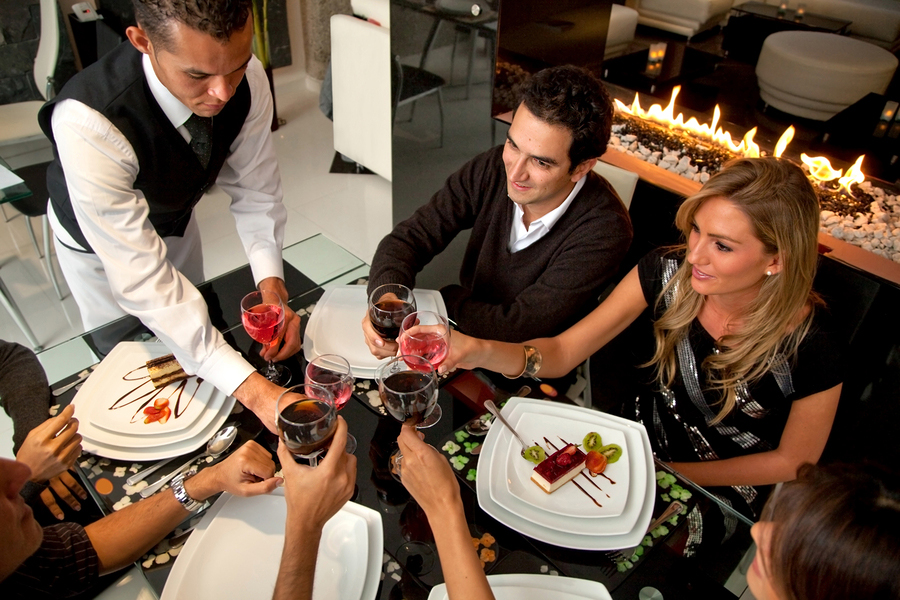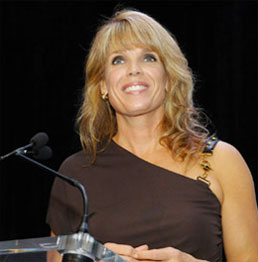Zero Waste Atlanta
Air Date: Week of July 26, 2013

(Bigstockphoto.com)
From organic food to composting to replacing plastic straws with paper ones; eco-activist Laura Turner Seydel tells host Steve Curwood there are a lot of easy things the restaurant industry can do to become more sustainable.
Transcript
CURWOOD: It's Living On Earth, I'm Steve Curwood. The restaurant and hospitality business can pile up lots of waste if it isn’t careful - everything from left over food to used containers to cooking oil. And to keep all that junk and goop out of landfills, the restaurants, hotels and convention center in downtown Atlanta got together a few years back to create the first zero waste zone in the southeast. Eco activist and restauranteur Laura Turner Seydel joins us now. Tell me Laura, how did the downtown Atlanta Zero Waste Zone get started?

Laura Turner Seydel (Laura Turner Seydel)
SEYDEL: Well, it really came out of the need to create a more sustainable city. We actually lost a conference to a city that was perceived to be greener. So the city of Atlanta rallied to make our city perceived as greener and came up with the zero waste zone.
CURWOOD: The restaurants got involved here. What was done involving the restaurants, and why are they so important?
SEYDEL: Well, first of all, the four parameters that were adopted by each one of the restaurants as part of the convention centers, the arenas, the hotels were: one, all the spent grease was collected to be turned into biodiesel; all of the valuable materials, such as corrugated cardboard, paper, glass, aluminum, plastic, food cans needed to be recycled; all the residual good food would be distributed to the homeless and the hungry based on the good Samaritan laws; and then all the food prep residuals were to be composted. And all of that has been happening. We’ve had record numbers of businesses adopt these parameters and become part of the zero waste zone initiative, and it really grew to other parts of Atlanta and Georgia based on the success that we experienced in downtown Atlanta.
CURWOOD: I know you’re on the board of your dad’s restaurant chain. You call it, what, Ted’s Montana Grill?
SEYDEL: That’s right. We say “eat more, bison.”
CURWOOD: So I imagine you made these changes in your own restaurant beyond, of course, just serving buffalo, right?
SEYDEL: Well, you are so right. In 2002, we opened our first restaurant. We have, actually, 44 now. But we have made a huge commitment as leaders in sustainability for the industry. One of our big commitments is going 99 percent plastic free. And one of my pet peeves has become plastic straws. When I learned that 500 million plastic straws go from our lips to the landfill after one use on each day in the United States, I really became a huge opponent to plastic straws, and we actually have paper straws at Ted’s. We actually put the guy that manufactured paper straws back into business, and now the guy’s a millionaire and has been making paper straws for the cruise ship line industry and other companies that are trying to do what we’re doing and reduce the amount of plastic.

Disposable plastic straws are not on the menu in a “green” restaurant. (Bigstockphoto.com)
But one of the really important things that has evolved out of the zero waste zone and our partnership with the National Restaurant Association - they’ve made a big commitment to sustainability and have produced and put on their website, available to their members, 65 different videos that are how-tos...how to reduce water use, energy use, how to manage recycling and waste, and these are just great ways for restaurants, and really important ways that restaurants are able to reduce the cost associated with operations. And it really is a big deal in a down economy for these small and medium size companies to be able to reduce costs.
CURWOOD: Laura Turner Seydel, thank you so much for taking this time with me today.
SEYDEL: Well, thank you, Steve, and we’ll look forward to seeing you soon.
Links
Living on Earth wants to hear from you!
Living on Earth
62 Calef Highway, Suite 212
Lee, NH 03861
Telephone: 617-287-4121
E-mail: comments@loe.org
Newsletter [Click here]
Donate to Living on Earth!
Living on Earth is an independent media program and relies entirely on contributions from listeners and institutions supporting public service. Please donate now to preserve an independent environmental voice.
NewsletterLiving on Earth offers a weekly delivery of the show's rundown to your mailbox. Sign up for our newsletter today!
 Sailors For The Sea: Be the change you want to sea.
Sailors For The Sea: Be the change you want to sea.
 The Grantham Foundation for the Protection of the Environment: Committed to protecting and improving the health of the global environment.
The Grantham Foundation for the Protection of the Environment: Committed to protecting and improving the health of the global environment.
 Contribute to Living on Earth and receive, as our gift to you, an archival print of one of Mark Seth Lender's extraordinary wildlife photographs. Follow the link to see Mark's current collection of photographs.
Contribute to Living on Earth and receive, as our gift to you, an archival print of one of Mark Seth Lender's extraordinary wildlife photographs. Follow the link to see Mark's current collection of photographs.
 Buy a signed copy of Mark Seth Lender's book Smeagull the Seagull & support Living on Earth
Buy a signed copy of Mark Seth Lender's book Smeagull the Seagull & support Living on Earth

